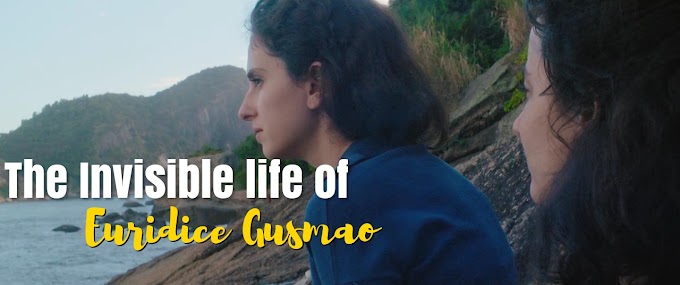"Guida....what was it?"
"A boy."
"Lucky him."
You don’t have to try hard to remember this film, it will haunt you forever… Have you experienced that you are infuriated at something but feel so helpless and only can cry? This blood-boiling, nightmarish movie had started to get gripe over me from the beginning, and bit by bit was choking me emotionally. After completing the film, I was numb, stunned, and still…that moment was death-like. Indeed, after ‘Parasite,’ ‘The Lighthouse,’ and ‘For Sama,’ this is my fourth favorite movie of 2019, among whichever I have seen so far.
The movie had its world premiere at the 2019 Cannes Film Festival and has won the top prize in the ‘Un Certain Regard' section of it. It was Brazilian submission for the Academy Award (2020) in the category of Best International Feature film. This Portugal-language Brazilian movie, based on the novel 'The Invisible Life of Euridice Gusmao' (2016) written by Martha Batalha has portrayed the lives of two sisters Euridice (Carol Duarte) and Guida (Julia Stockler) living in the 1950s’ Rio de Janeiro. Two different women with different desires are tied by a sisterly bond, who love and support, inspire and influence each other. They are part of a conservative family, where there is neither a place for Euridice’s aspiration to become a pianist nor Guida’s choice to choose a life partner by herself. An incident separates them, and they struggle to bond again till the end. The struggle becomes more gruesome due to a biased-suppressive patriarchal society. Story juggles in the narrations of two lives of these women. They try to reach others through letters and write about what there are facing and how life would be different if they were together. They don’t even know whether their messages are reaching each other or not.
Their separation begins when Guida runs away from home with her lover and goes to Greece. When she returns after a few months, unmarried and pregnant, her father refuses to take her back (supporting honor of his family). When she inquires about Euridice, he lies that she has moved to Austria to aspire to a dream of becoming a pianist, but Euridice has been married and lives in Rio with her husband. This vicious lie forced these sisters to search for each other for a lifetime. The talented director Karim Ainouz connects us from the very first frame. While roaming around in the jungle, they lose sight of each other; both start calling their names, they are close somewhere yet could not find one another. This foreshadowing scene leads toward the cataclysmic story. Mr. Karim has given brief but beautiful close moments to them that we too yearn for them to get together after their separation, which feels like an eternity.
‘Invisible Life of Euridice Gusmao’ is an accurate title for the story. Injustice to loud and aggressive Guida is visible. False promises, unmarried and pregnant, rejection, shamed identity, prostitution, life in a slum area, working with men with no respect, selling the body for drugs, etc., represent how visibly woman is facing troubles in the male-dominant society. But then what sensible and poised Euridice faces under the disguise of good married life, acceptance from community, support of family raises the question, this is all a woman wants, isn’t she? She marries an older man, and their awkward, violent, abusive intimate scene at the wedding night is such vehement looks like he rapes her. At the initial stage of marriage, she becomes a mother, for which she is not ready yet, but as a married woman, she has no choice. She wants to be a pianist, but then, “you already know how to play the piano, what more you want?”. This is the invisible pain, which is conformity by many women (mothers, sisters, wives, grandmothers, etc.) around the world in the name of ‘fate.’
Right now, I cannot remember any movie about women picturized so sensibly and emotionally by a male director. After the movie, I am not only interested in other films the direct Karim Ainouz, but also in the other work of its French cinematographer Helene Louvart for giving her miraculous touch to the story.
So, what will your words when you can get only one and last chance to say something to someone?










9 Comments
All Things was superb you discribed very sensibly nd creativly people will like very much
ReplyDeleteThank you dear...
DeleteFrom your 2D words I can feel the 3D scenes
ReplyDeleteTotally mind throbbing ...
I try my best with my words so reader can get idea about movies.
DeleteFrom your 2D words I can feel the 3D scenes .
ReplyDeleteTotally mind throbbing.
Quick answer:estar vivo !!
bonita :)
DeleteIt looks like a unique portrayal of female sexuality & casual cruelty they suffer from the men in their lives. You described it very creatively. 👍
ReplyDeleteyes, and women conformity in their decided 'fate'. Incredible movie
DeleteEven me too. I have added him in my director to be completed.
ReplyDelete